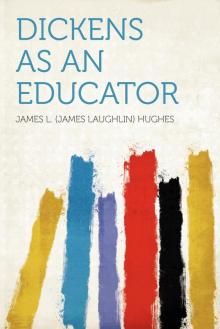- Home
- James L. Hughes
Dickens As an Educator Page 2
Dickens As an Educator Read online
Page 2
AUTHOR'S PREFACE.
This book has two purposes: to prove that Dickens was the great apostle ofthe "new education" to the English-speaking world, and to bring intoconnected form, under appropriate headings, the educational principles ofone of the world's greatest educators, and one of its two most sympatheticfriends of childhood.
Dickens was the most profound exponent of the kindergarten and the mostcomprehensive student of childhood that England has yet produced. He wasone of the first great advocates of a national system of schools, and hisrevelations of the ignorance and the intellectual and spiritualdestitution of the children of the poor led to the deep interest whichultimately brought about the establishment of free schools in England.
He was essentially a child trainer rather than a teacher. In thetwenty-eight schools described in his writings, and in the training of hisarmy of little children in institutions and homes, he reveals nearly everyform of bad training resulting from ignorance, selfishness, indifference,unwise zeal, unphilosophic philosophy, and un-Christian theology. No otherwriter has attacked so many phases of wrong training, unjust treatment,and ill usage of childhood.
He is the most distinctive champion of the rights of childhood. He struckthe bravest blows against corporal punishment, and against all forms ofcoercive tyranny toward the child in homes, institutions, and schools,even condemning the dogmatic will control of such a placid, Christianwoman as Mrs. Crisparkle. He demanded a free, real, joyous childhood, richin all a child's best experiences and interests, so that "childhood mayripen in childhood." He pleaded for the development of the individualityof each child. He taught the wisdom of giving a child proper food, and heshowed the vital importance of real sympathy with the child, not mereconsideration for him. He was the English father of true reverence for thechild.
But Dickens studied the methods of cultivating the minds of children, aswell as their character development. He exposed the evils of cramming morevigorously than any other writer. He taught the essential character of theimagination in intellectual and spiritual development. He showed the needof correlation of studies, and of apperceptive centres of feeling andthought in order to comprehend, and assimilate, and transform intodefinite power the knowledge and thought that is brought to our minds.
It is said by some, who see but the surface of the work of Dickens, thathis work is done. Much of the good work for which he lived has been done,but much more remains to be done. Men are but beginning the work of childstudy and of rational education. The twentieth century will understandDickens better than the nineteenth has understood him. His profoundphilosophy is only partially comprehended yet, even by the leaders ineducational work. Teachers and all students of childhood will find in histrue feeling and rich thought revelation and inspiration.

 Dickens As an Educator
Dickens As an Educator